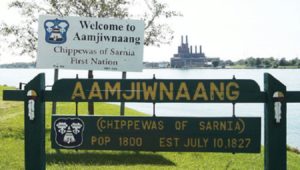Aamjiwnaang First Nation Heritage and Culture group host special workshop tomorrow

By Colin Graf
AAMJIWNAANG FIRST NATION—First Nations looking for reconciliation in Canada have to start by looking in an unexpected place….inward. That’s the idea being explored by E’maawizidijig, the Heritage and Culture group of Aamjiwnaang First Nation, located in Sarnia, at a special workshop this Saturday February 4.
Reconciling differences within Indigenous communities, especially around matters of religion and spirituality, has to take place before the process can be successful with non-indigenous Canada, according to Marina Plain, founder and chair of the group.
The young generation in her community have a ‘hunger’ for knowledge about traditional spiritual practices, but many parents and Elders can’t even talk about the subject because they were raised in a Christian environment and quite a few were sent to residential schools, and lost contact with traditional teachings.
Guest speaker at the meeting will be Nancy Rowe, an educator, consultant, and a Traditional Practitioner of Anishinabek lifeways, views, and customary practices. She is a Mississauga, Ojibwe of the Mississaugas of New Credit First Nation, ON, near Brantford. Rowe coordinates Akinomaagaye Gaamik, a grass roots initiative to provide educational opportunities for all people interested in Indigenous perspectives of life, health, education, history, and the environment.
Rowe leads workshops for indigenous communities and various professional groups and agencies, Plain says.
Plain herself, knows the conflict between different ways of thinking and feeling. With a grandfather who was a United Church preacher, she identified herself as a Christian, but as an adult, she learned the 7 Grandfather Teachings and felt that they had importance in her life as well.
“The interest of the young people extends beyond spirituality to other areas of Anishinabek heritage such as drum-making, beading, and other craft forms,” Plain says. “Crafting workshops run by the group are having great success.”
While some communities experience serious divisions over spiritual beliefs, Plain doesn’t feel Aamjiwnaang is suffering that way.
“Our Elders are engaging with [the Heritage Group’s] work…and want to be part of exploring traditional ways,” she says. “Together we are really gaining strength.”
“The problem for First Nations that are over-shadowed by nearby cities such as hers is assimilation,” Plain explains. “Much of the land reserved for the community was taken away over the years, and when that is combined with the loss of community feeling caused by children being taken to residential schools, much has been lost.”
Aamjiwnaang is completely inside the municipal boundaries of Sarnia.
“Not only has the legacy of residential schools eroded knowledge of traditional ways, but it has also damaged communication between the generations,” Plain explains, citing a very personal example.
Plan didn’t know her grandfather had gone to a residential school until during a visit to the school near Mt. Brydges, ON, she saw his name on a plaque listing former students.
“My Mom didn’t even know,” she remarked.
The workshop and potluck meal will take place Sat. Feb. 4 at the Maawn Doosh Gumig Community and Youth Centre on Virgil Ave. from 11:00 a.m. – 2:00 p.m.

